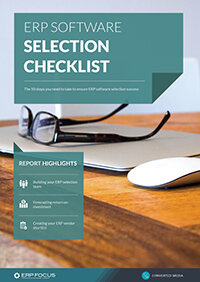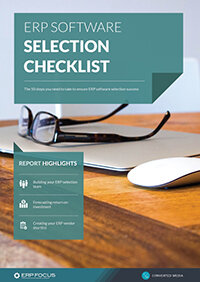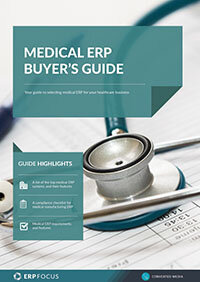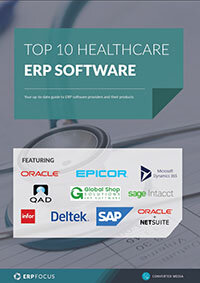What do we mean by 'medical ERP'?
As a catch-all term, medical ERP largely relates to resources-oriented software systems that deliver and manage information in concert with products and services throughout the medical industry. However, several subordinate yet highly specific categories exist within this general category.
ERP-based medical device manufacturing
The use of ERP in medical device manufacturing is quite sophisticated, particularly since these systems not only house traditional processes such as production control and inventory management capabilities, but also harbor dense sets of policy-based rule-sets that actively supervise, and validate internal manufacturing operations. This is primarily because medical device production is highly regulated and operationally supervised both by State and Federal administrators.
Consequently, ERP platforms must adhere to these rules before, during, and after product delivery. Here is a pro forma list of applied classification and type requirements from the Food and Drug Administration.
Use our healthcare ERP comparison tool to compare top medical ERPs
The FDA classifies approximately 1,700 different generic types of devices, grouped into 16 medical specialties referred to as panels. Each generic type is assigned to one of three regulatory classes based on the level of control necessary to ensure device safety and effectiveness. These classes include:
1. Class I General Controls
2. Class II General Controls and Special Controls
3. Class III General Controls and Premarket Approval
Within these classes, discrete device types are reviewed and validated on a recurrent basis, to ensure that quality assurance is maintained throughout a particular manufacturer’s supply chain.
ERP systems associated with major medical manufacturing brands include the following.
Microsoft Dynamics AX - clients in the medical device manufacturing sector can maximize investment by leveraging ERP precepts. The system’s flexible, scaled, and comprehensive solutions meet specific industry and regulatory requirements. The system enables the management of large-scale data sets, streamlines operations throughout the medical manufacturing enterprise, ensures compliance with applicable regulations, and maximizes critical operational efficiencies.
Cetec ERP - Cetec's all-in-one cloud ERP solution for medical device and bioscience manufacturers meets regulatory requirements and simplifies FDA and CFR Part 11 compliance.
It supports ISO 13484 by streamlining quality tracking for medical devices, covering manufacturing, inventory, document control, Non-Conformance Reports (NCRs), Corrective Action Requests (CARs), and inspection management. Cetec integrates data collection into paperless work instructions, enforcing process control and requiring data entry at specific steps before a part can proceed, thus addressing the challenges of process enforcement and document management.
ERP-based medical management records (EMR)
These healthcare ERP variants support general and specialized doctors, nurses, and administrators by storing, cataloging, and managing patient information related to individual consultations.
Systems typically allow practitioners to establish comprehensive databases associated with discrete patient data, manage, and index patient diagnoses and maintain various follow-on courses of treatments. All system data is secured and governed by covenants associated with the Health Insurance Portability and Accountability Act (HIPAA) in the United States, and International guidelines elsewhere.
ERP systems associated with major medical records management brands include the following.
ERP Medical - ERP Medical allows practitioners to manage large volumes of records secured based on HIPAA requirements. All relevant patient entries can be viewed on easy-to-use dashboards, in addition to the ability to transmit information electronically to remote sites, and/or produce paper reports as necessary.
WebPT – WebPT is a leading rehab therapy platform specifically oriented to the support of patient care. The system offers scheduling, documentation, billing, outcome tracking, business reports, and system integration.
ChartLogic - ChartLogic, Inc. provides a full ambulatory EHR suite including electronic medical records, practice management, revenue cycle management, e-prescribing, and a patient portal.
ERP-based pharmaceutical distribution and inventory
Pharmaceutical and medical inventory software primarily relate to medical and pharmaceutical distributors/wholesalers requiring comprehensive inventory management and rigid product traceability. These systems feature elements related to; lot tracking (traceability), electronic data interchange (EDI) integration, and granular cost-tracking. They are usually internally compliant with US and international FDA/ISO data security regulations.
The following are ERP systems associated with major medical pharmaceutical distribution/inventory management brands.
Blue Link - Blue Link offers robust accounting and inventory software as an integrated ERP software system. The system provides advanced functionality available out-of-the-box plus various optional components. Blue Link can also be completely customized to meet your needs. Specific features include;
- Lot tracking (Traceability)
- Landed cost tracking
- Serialization
- Order entry and invoicing
- Revision control
- Inventory control
- AR/AP, GL, bank management etc.
- Track national drug codes (NDC#)
- DEA license # tracking
Given the constant evolution in the medical space, other subordinate categories are beyond the space available in this short article. That said, however, if you find other systems of note send them along, and we’ll try to cover them in follow-on issues.
Free white paper

60-Step ERP Selection Checklist
Get the comprehensive checklist for your ERP selection project

Featured white papers
-

-

Top 10 Healthcare ERP System Comparison
Download
Related articles
-

Five features to look for in a medical manufacturing ERP
Advice on compliance, CA/PA, document management, and more.
-

CMMC Compliance: What Aerospace and Defense Manufacturers Need to Know
Key insights on CMMC compliance, deadlines, and securing DoD contracts with CMMC 2.0 certificatio...
-

A compliance checklist for medical manufacturing ERP
These are the compliance requirements your medical device manufacturing ERP should help you meet

